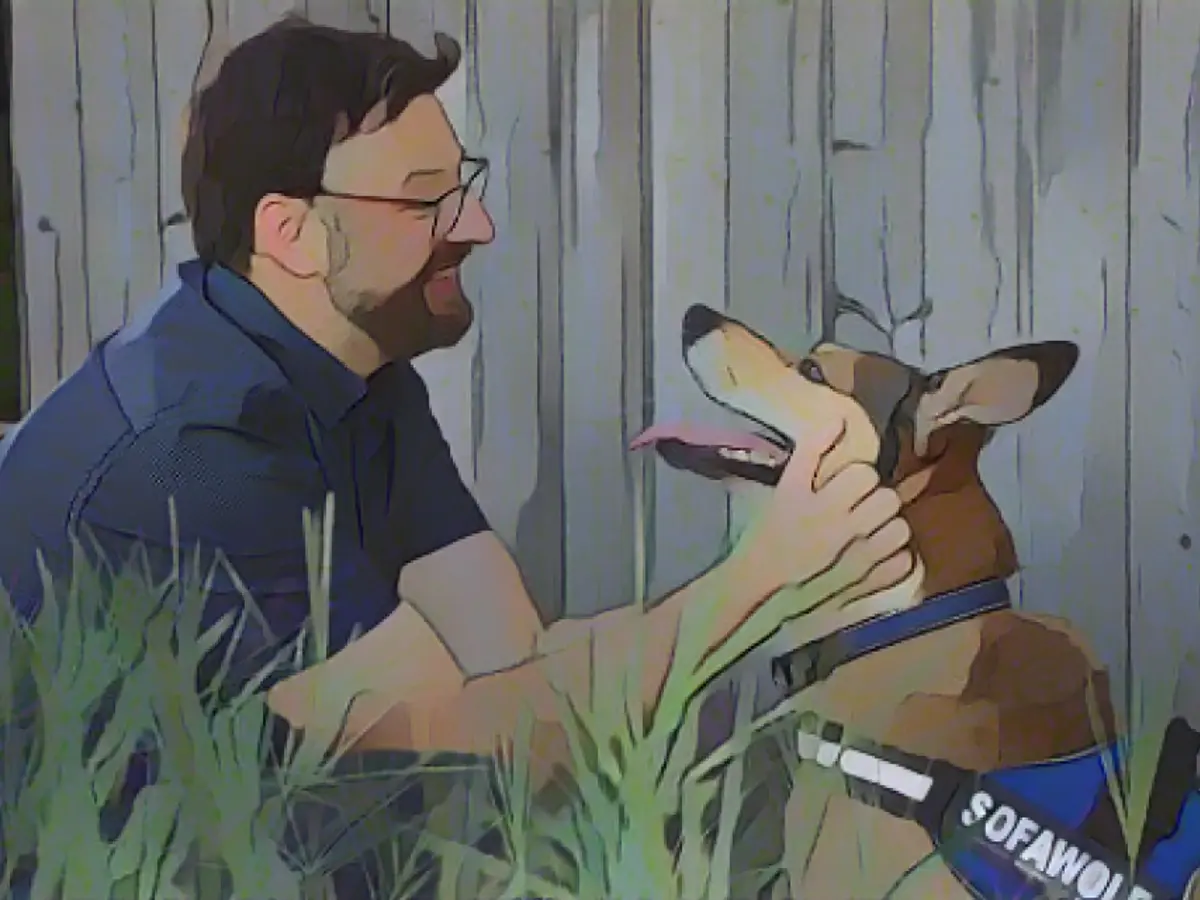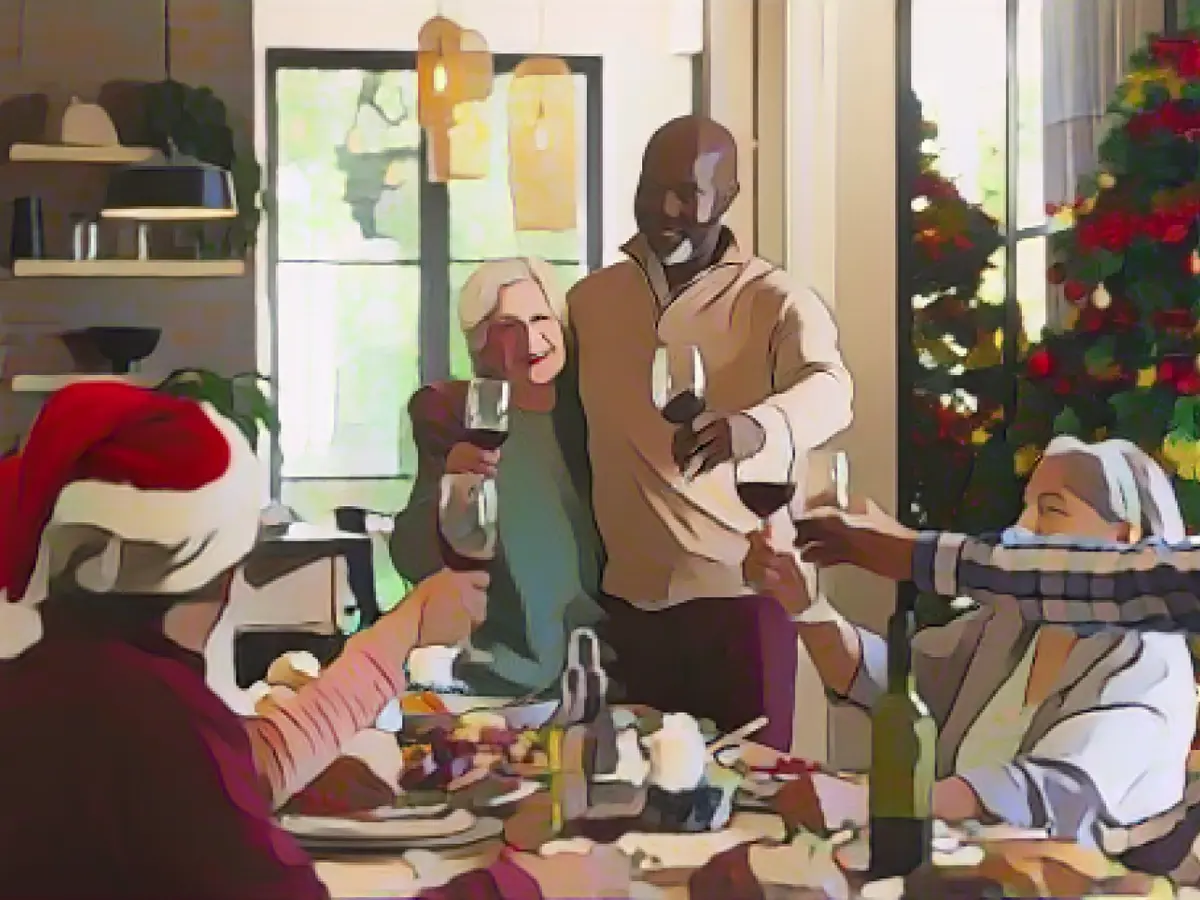Celebrating with strangers - Merry Christmas: How a former single man brings lonely people together for Christmas
On Christmas Eve 2016, Christian Fein stood on his balcony in Ludwigshafen and smoked into the silence, freezing. The otherwise bustling streets were empty, no people, hardly any noise. Not even the train in front of the toy store downstairs was running. Fein imagined all the women, men and children in the surrounding houses excitedly unwrapping presents, cooking and drinking together and laughing. "At that moment, I became painfully aware that I didn't want to be alone," says Fein. He had spent the past seven years sitting under the Christmas tree with his wife, but now they were separated. She was celebrating with her family, of which he was no longer a part.

He pulled his cell phone out of his pocket and wrote on Twitter:
"I think yes, those who are alone on Christmas Eve should find company under #NobodyTwittersAlone today. Spread the word!"
And it spread. Comments poured in every minute.
"Thank you for being there! :-)"
"How great is this hashtag? Nice to see that you're not the only one alone today."
"Thanks to everyone out there, it makes the evening feel less lonely. :-* :-)"
Christian Fein was still alone, but suddenly in the best of company. In no time at all, his hashtag became the number one trending topic on Twitter. Even on New Year's Eve and in January, people were still using it to feel less lonely.
"We'll find someone to keep us company."
The year passed. Fein met a new woman, moved in with her and was happy again. But when the next winter came, he remembered how many people were looking for company at this time of year. "That's when I came up with this completely naive idea: What if I just brought these people together?"
He opened the blue Twitter pigeon and wrote: "So. If you're already familiar with spending Christmas Eve alone and want to do something about it, get in touch under this tweet. We'll find someone to provide/offer company."
Around 2700 people wrote to him. He was able to find a few hundred. All he needed was an Excel spreadsheet. "I come from a management consultancy background, so that was the most obvious thing for me." In the spreadsheet, Fein collected the accounts of those searching and the cities in which they lived. Then they were connected.
Not only users became aware of the project. Fein's idea appeared in the Word on Sunday, in newspapers and on television. And the hashtag #keinertwittertallein became #Keinerbleibtallein. There was now also a website. In winter 2018, 18,000 registered, in 2019 a whole 65,000. Then came corona. In 2020 there was a virtual Christmas get-together, in 2021 a few thousand met under 3G regulations. Things didn't really take off again until last year, when he received almost 39,000 requests.
Fein actually works as a management consultant at Deutsche Post. But since his idea turned into such a big project, every year from mid-November he is solely concerned with countering people's loneliness. He devotes his entire annual vacation to connecting people with the help of his Excel spreadsheets. "Most of the people who contact us are between 18 and 50 years old - loneliness is not a question of age," says Fein.
Very different people come together
When 43-year-old René Reichelt from Karlsruhe discovered Fein's offer, he was thrilled. "I decided immediately: All right, you're in," says the information technician. "Not so much because I was lonely, but because I thought it was such a great idea."
Reichelt is a heavy user and has been inviting strangers to his home at Christmas for several years now. He has an extendable table there and gets the missing chairs from his neighbors, some of whom are always there for the party. He buys roast pork or duck, this year it will probably be goose, always accompanied by Thuringian dumplings and lots of gravy. We cook together.

The people who come together are very different. Once there was a woman who had to clear out her parents' house over the holidays and didn't know where to go. Another time, it was a woman with two small children whose husband had recently died. AndaAnother time a woman in her 20s who was looking for an excuse not to celebrate with her parents - just like Reichelt himself, who has been avoiding Christmas with his family in Erfurt for years. He has already had up to 13 guests. "The more the merrier," is his experience. "In a small group, often nobody says anything. But in such a large group, you can't avoid it. Can you pass me the dumplings, here's the sauce, there's so much dynamism at the table, everyone gets talking."
Many initiatives and associations help the lonely and those left alone
#keinerbleibtallein is one of many initiatives and associations for lonely people of all ages. There are apps such as Helpcity, where people in similar situations can exchange information anonymously, associations such as "Silbernetz e.V.", which arranges telephone friendships for senior citizens, or "Freunde alter Menschen e.V.", which organizes visiting partnerships. At the nationwide neighborhood network nebenan.de, you can find all content related to the Advent season and the festivities under the menu item "Christmas": Exchanging cookie recipes, posting Christmas wishes, neighborhood Secret Santa - there are no limits to the imagination.
For a long time, loneliness was a taboo subject, hardly noticed politically. In the meantime, however, politicians have recognized the urgency of the issue and the government recently adopted a strategy against loneliness with more than 100 individual measures. This is because increasing loneliness poses a massive threat to health and is associated with depression and physical illnesses such as diabetes, heart attacks and strokes. It shortens life expectancy and is also a risk factor for civil society: chronically lonely people are more likely to reject democracy as a form of government and are more prone to conspiracy theories than those who are socially well integrated.
People who are at risk of loneliness are particularly vulnerable to old age, low education, low income and job seekers. In the years of the pandemic, a new risk group was added: Teenagers and young adults who have lost their social environment. According to a recent study, one in seven young people in North Rhine-Westphalia feels very lonely. But people who have gone through a period of upheaval are also affected: Separation from a partner, a move to another city, a new job. People who may have enough friends, but just not where they live - and not at Christmas, when families get together.
What sets #keinerbleibtallein apart from the other offers is that it is only designed for Christmas and New Year's Eve. And it should stay that way. "During the year, people are not helped by simple local contacts. We once tested this in Berlin with a huge media effort. It does absolutely nothing," says Christian Fein.
Loneliness remains a taboo subject
He deliberately does not cater to the extra wishes of those seeking help. This is also because he doesn't want to lure people with criminal or sexual intentions. "Of course, I do pay attention to inclusive needs or if, for example, a single mother says she doesn't want a male counterpart." To meet the demand, volunteers often help out just before Christmas - this year there are four of them. "I've also considered using an AI". But then Fein thinks about those who need more than an algorithm. Because sometimes the loneliness is already so advanced and the need for conversation so great that he first refers these people to a telephone counseling service. If he suspects that people are at risk of suicide, he also tries to organize help from nearby. He has also sent an ambulance or the police a few times.
There is one thing that #nobody stays alone and all the other initiatives have not yet achieved: that the topic of loneliness is freed from the taboo zone. That those affected can talk openly about the fact that they too often feel alone in the world. Psychotherapists and general practitioners that stern spoke to for this research also know this: You can't get to the subject of loneliness by asking a specific question: "Do you often feel lonely?" Most people would say no, even if they are.
Even those who only feel alone at Christmas obviously have problems admitting it publicly. Fein experiences this time and again when he is asked by the media before the festive season whether he could put them in touch with users of his portal. Fein is glad that at least the Karlsruhe IT specialist René Reichelt is so open about the topic.
Another woman he referred to stern clarified by email that there might have been a misunderstanding: "Loneliness is not generally a priority for me, I just don't want to celebrate Christmas Eve alone, which my friends spend with their families." During the phone call, it became clear that she was also afraid that her employer would find out that she was meeting up with strangers at Christmas because she would otherwise be alone. As if it were a disgrace to take advantage of offers such as #keinerbleibtallein.
Loneliness has become a hot topic in politics. However, people still have to learn to talk about it openly - and perhaps even admit the feeling to themselves first. Loneliness researcher Maike Luhmann believes that it also has positive aspects. It is a "warning signal". Just as thirst motivates us to drink more, it drives us to make more of an effort to socialize. Most of the time, we succeed. This Christmas could be a start.
Read also:
- 80 percent of young Germans eat sustainably
- Syphilis cases in babies are increasing dramatically
- Syphilis cases in babies are increasing dramatically
- Corona or flu epidemic? These pathogens are making us cough and sniffle right now
On Christmas Eve 2017, feeling the sting of loneliness and depression following his separation, Christian Fein decided to use his self-help skills to create a change. He recognized that many others might also be feeling alone during the holiday season, and so he actively sought out those individuals through social media, encouraging them to join others for a #keinerbleibtallein Christmas gathering.
By the next year, Fein's initiative had grown exponentially, attracting thousands of people looking for company during the festive season. His project, initially just an idea born out of his personal experience with loneliness and depression, was now cemented as a powerful force against isolation, helping to spread joy and companionship amidst the holiday cheer.
Source: www.stern.de








